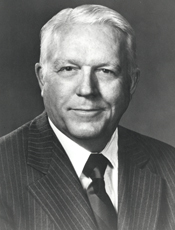John James Flynt, Jr.
| John James Flynt Jr. | |
|---|---|
 |
|
| Member of the U.S. House of Representatives from Georgia's 6th district |
|
|
In office January 3, 1965 – January 3, 1979 |
|
| Preceded by | Carl Vinson |
| Succeeded by | Newt Gingrich |
| Member of the U.S. House of Representatives from Georgia's 4th district |
|
|
In office November 2, 1954 – January 3, 1965 |
|
| Preceded by | Albert Sidney Camp |
| Succeeded by | James MacKay |
| Member of the Georgia House of Representatives | |
|
In office 1947–1948 |
|
| Personal details | |
| Born |
November 8, 1914 Griffin, Georgia |
| Died | June 24, 2007 (aged 92) Griffin, Georgia |
| Political party | Democratic Party |
John James Flynt Jr. (November 8, 1914 – June 24, 2007) was a United States Representative from Georgia.
Born in Griffin, Georgia, Flynt attended the public schools and Georgia Military Academy (now the Woodward Academy). He later attended the University of Georgia at Athens where he was a member of the Phi Kappa Literary Society and received an A.B. in 1936. He served in the United States Army from 1936 to 1937 and again from 1941 to 1945; he was also a member of the United States Army Reserve.
Flynt attended the Emory University School of Law in 1937 and 1938 and graduated from George Washington University Law School in 1940. He was a lawyer in private practice and was assistant United States attorney for northern district of Georgia from 1939 to 1941 and again in 1945 and 1946. He was a member of the Georgia House of Representatives 1947–1948, and was solicitor general for Griffin Judicial Circuit from 1949 to 1954. In 1952–1954, he was president of the Georgia Bar Association. Flynt was a delegate to the Georgia State Democratic conventions in 1946, 1950, 1954, 1958, 1962, and 1966, and was a delegate to the Democratic National Conventions of 1960 and 1968.
Flynt was elected as a Democrat to the Eighty-third Congress by special election to fill the vacancy caused by the death of Representative A. Sidney Camp, and at the same time was elected to the Eighty-fourth Congress. He was reelected to the eleven succeeding Congresses, serving from November 2, 1954 to January 3, 1979. While in Congress, he was chair of the Committee on Standards of Official Conduct (Ninety-fourth and Ninety-fifth Congresses).
...
Wikipedia
